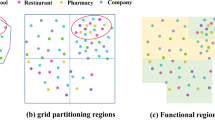Abstract
In many geography-related problems, clustering technologies are widely required to identify significant areas containing spatial objects, particularly, the object with non-spatial attributes. At most of times, the resultant geographic areas should satisfy the geographic non-overlapping constraint. That is, the areas should not be overlapped with other areas. If without non-spatial attributes, most spatial clustering approaches can obtain such results. But in the presence of non-spatial attributes, many clustering methods can not guarantee this condition, since the clustering results may be dominated in non-spatial attribute domain which can not reflect the geographic constraint. In this paper, a new spatial distance measure called penalized spatial distance (PSD) is presented, and it is proofed to satisfy the condition which can guarantee the constraint. PSD achieves this by well adjusting the spatial distance between two points according to the non-spatial attribute values between them. The clustering effectiveness of PSD incorporated with CLARANS is evaluated on both artificial data sets and a real banking analysis case. It demonstrates that PSD can effectively discover the non-spatial knowledge and contribute more reasonably to spatial clustering problem solving.
Preview
Unable to display preview. Download preview PDF.
Similar content being viewed by others
References
Xu, R., Wunsch II, D.: Survey of Clustering Algorithms. IEEE Trans. on Neural Networks 16, 645–678 (2005)
Ng, R., Han, J.: CLARANS: A method for clustering objects for spatial data mining. IEEE Trans. on Knowledge and Data Engineering 14, 1003–1016 (2002)
Tung, A.K.H., Hou, J., Han, J.: Spatial clustering in the presence of obstacles. In: Proc. of ICDE’01, pp. 359–367 (2001)
Ng, R., Han, J.: Efficient and Effective Clustering Methods for Spatial Data Mining. In: Proc. of VLDB’94, pp. 144–155 (1994)
Estivill-Castro, V., Lee, I.: AUTOCLUST: Automatic Clustering via Boundary Extraction for Mining Massive Point-Data Sets. In: Proc. of the 5th International Conference on Geocomputation (2000)
Estivill-Castro, V., Lee, I.: Autoclust+: Automatic clustering of point-data sets in the presence of obstacles. In: Roddick, J.F., Hornsby, K. (eds.) TSDM 2000. LNCS (LNAI), vol. 2007, pp. 133–146. Springer, Heidelberg (2001)
Ester, M., et al.: A density-based algorithm for discovering clusters in large spatial databases with noise. In: Proc. of SIGKDD’96, pp. 226–231 (1996)
Zaiane, O.R., Lee, C.-H.: Clustering spatial data in the presence of obstacles and crossings: a density-based approach. In: Proc. of International Database Engineering and Applications Symposium (2002)
Wang, X., Hamilton, H.J.: DBRS: A Density-Based Spatial Clustering Method with Random Sampling. In: Whang, K.-Y., et al. (eds.) PAKDD 2003. LNCS (LNAI), vol. 2637, pp. 563–575. Springer, Heidelberg (2003)
Wang, X., Rostoker, C., Hamilton, H.J.: Density-Based Spatial Clustering in the Presence of Obstacles and Facilitators. In: Boulicaut, J.-F., et al. (eds.) PKDD 2004. LNCS (LNAI), vol. 3202, pp. 446–458. Springer, Heidelberg (2004)
Author information
Authors and Affiliations
Editor information
Rights and permissions
Copyright information
© 2007 Springer Berlin Heidelberg
About this paper
Cite this paper
Zhang, B., Yin, W.J., Xie, M., Dong, J. (2007). Geo-spatial Clustering with Non-spatial Attributes and Geographic Non-overlapping Constraint: A Penalized Spatial Distance Measure. In: Zhou, ZH., Li, H., Yang, Q. (eds) Advances in Knowledge Discovery and Data Mining. PAKDD 2007. Lecture Notes in Computer Science(), vol 4426. Springer, Berlin, Heidelberg. https://doi.org/10.1007/978-3-540-71701-0_121
Download citation
DOI: https://doi.org/10.1007/978-3-540-71701-0_121
Publisher Name: Springer, Berlin, Heidelberg
Print ISBN: 978-3-540-71700-3
Online ISBN: 978-3-540-71701-0
eBook Packages: Computer ScienceComputer Science (R0)




